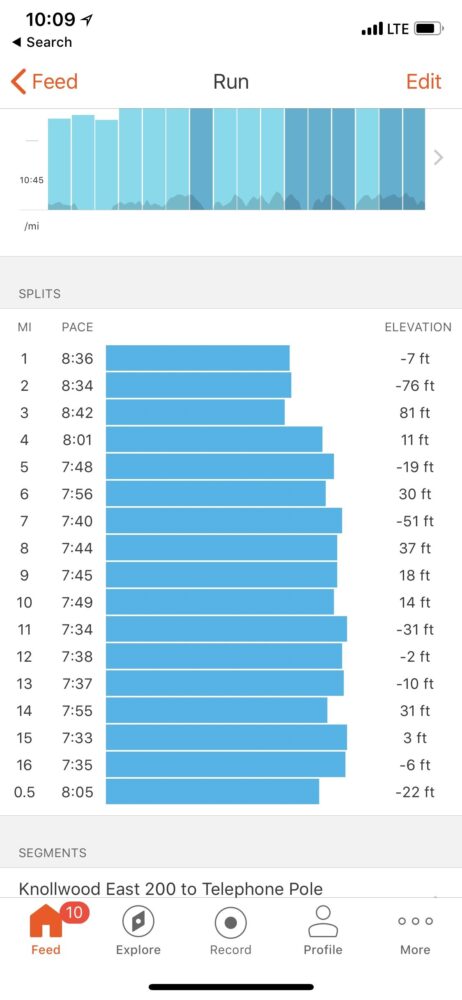

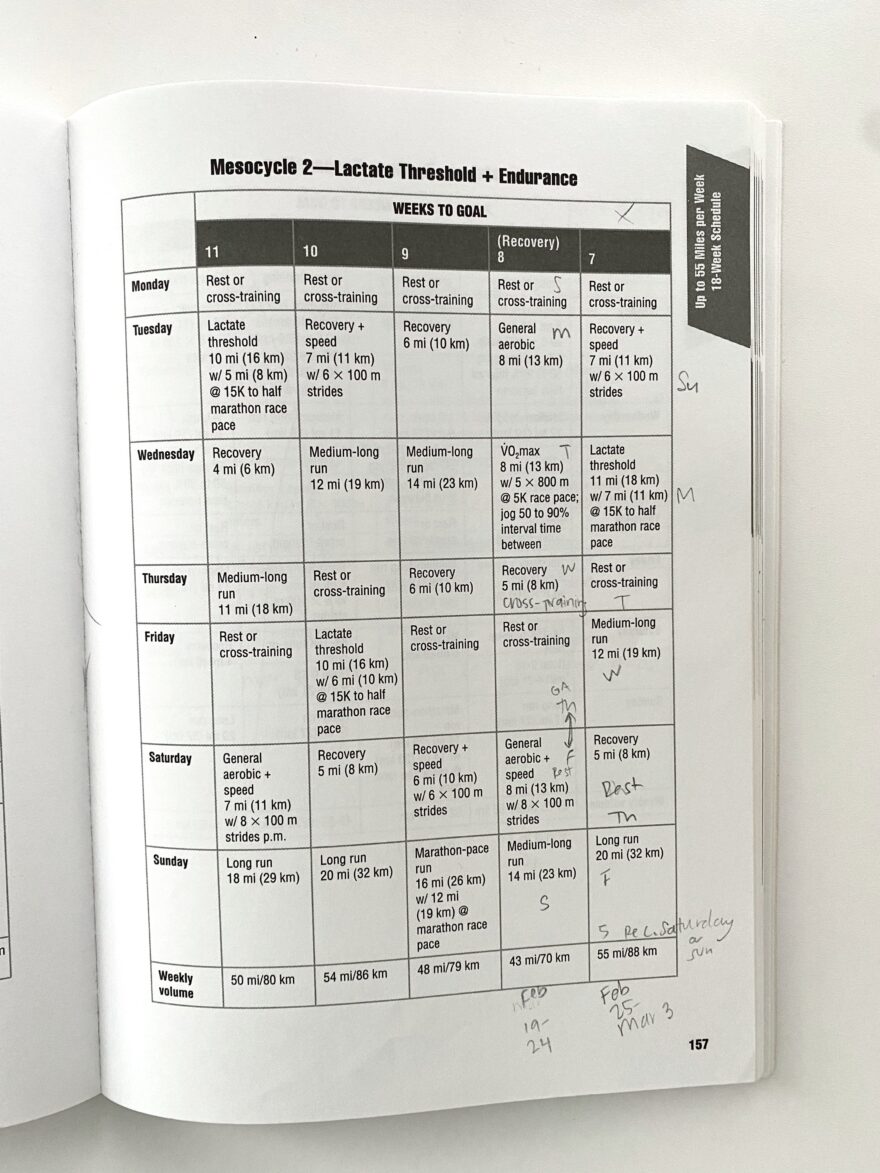
Planning to run a marathon this fall? I set a PR at the 2018 Boston Marathon using this advanced marathon training plan. See a sample training week and read how it compares to other plans I’ve used.
With marathon training happening this fall, I thought it would be a good time to republish this post from last year! When I published it the first time, most races were canceled, but races are back on the calendar now. Many runners are training for 26.2 whether they’re running an in-person race, or just like the ritual of training for a fall marathon and dreaming of the finish line.

I definitely won’t be training for a fall marathon since I’m just enjoying my lower weekly mileage these days. But, for those who are training for a fall race, I wanted to share the training plan that I used for my first Boston Marathon since it was a GREAT option. It was a big step from previous training plans I’d used for previous marathons (I’d say it’s geared towards experienced runners). And, in retrospect, I think it’s safe to say I was VERY well trained since I actually enjoyed the 2018 Boston Marathon and even set a PR. (2018 was the year of the worst weather on record for the Boston Marathon.) So, if you’re training, I hope this review of one of my favorite training plans helps you!
Even if you’re an intermediate runner, this plan might be a good fit for you, just read on to see! Be sure to read this post from Zap Endurance coach, Ryan Warrenburg, about how to train for a marathon and build up your mileage wisely! If you need help with all the things that go into a success training cycle beyond following a training plan (like warming up, cooling down, stretching, nutrition, motivation, injuries, recovery, and more), be sure to join the Rookie Runner Program. If you’re training for a marathon, you may not consider yourself a rookie but we all make rookie mistakes from time to time! And if you need group support, encouragement and feedback on your training, join our online training group too.
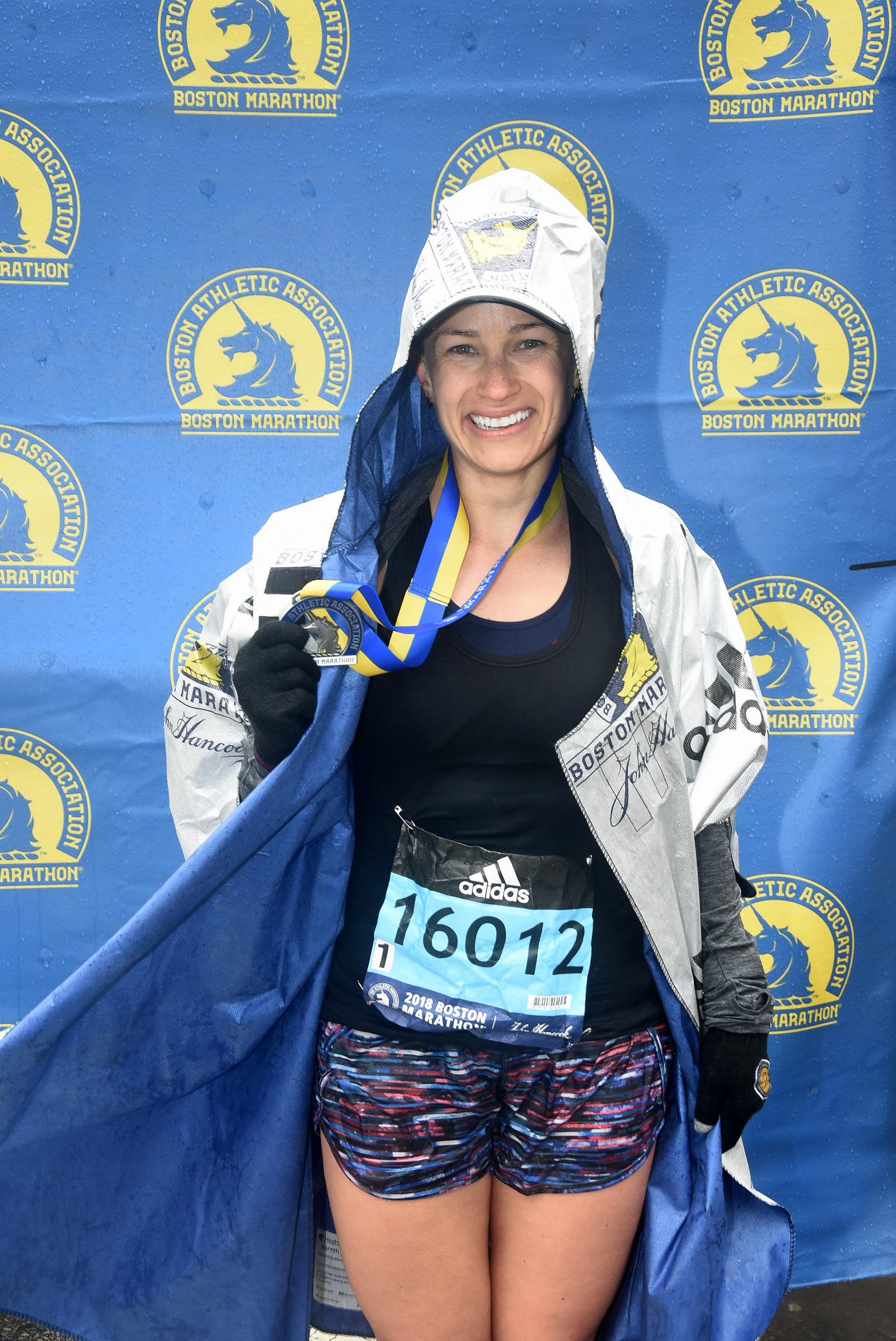
I wouldn’t consider myself an advanced marathoner considering I’ve only run four marathons. But, this plan really pushed me and helped me feel strong when all the conditions on race day were not in my favor. And if you’re racing this fall, the conditions likely will not be what you’re used to since races have “new normals”, so you’ll want your fitness dialed in to help support your mental game since you’ll be pushing outside of your comfort zone.
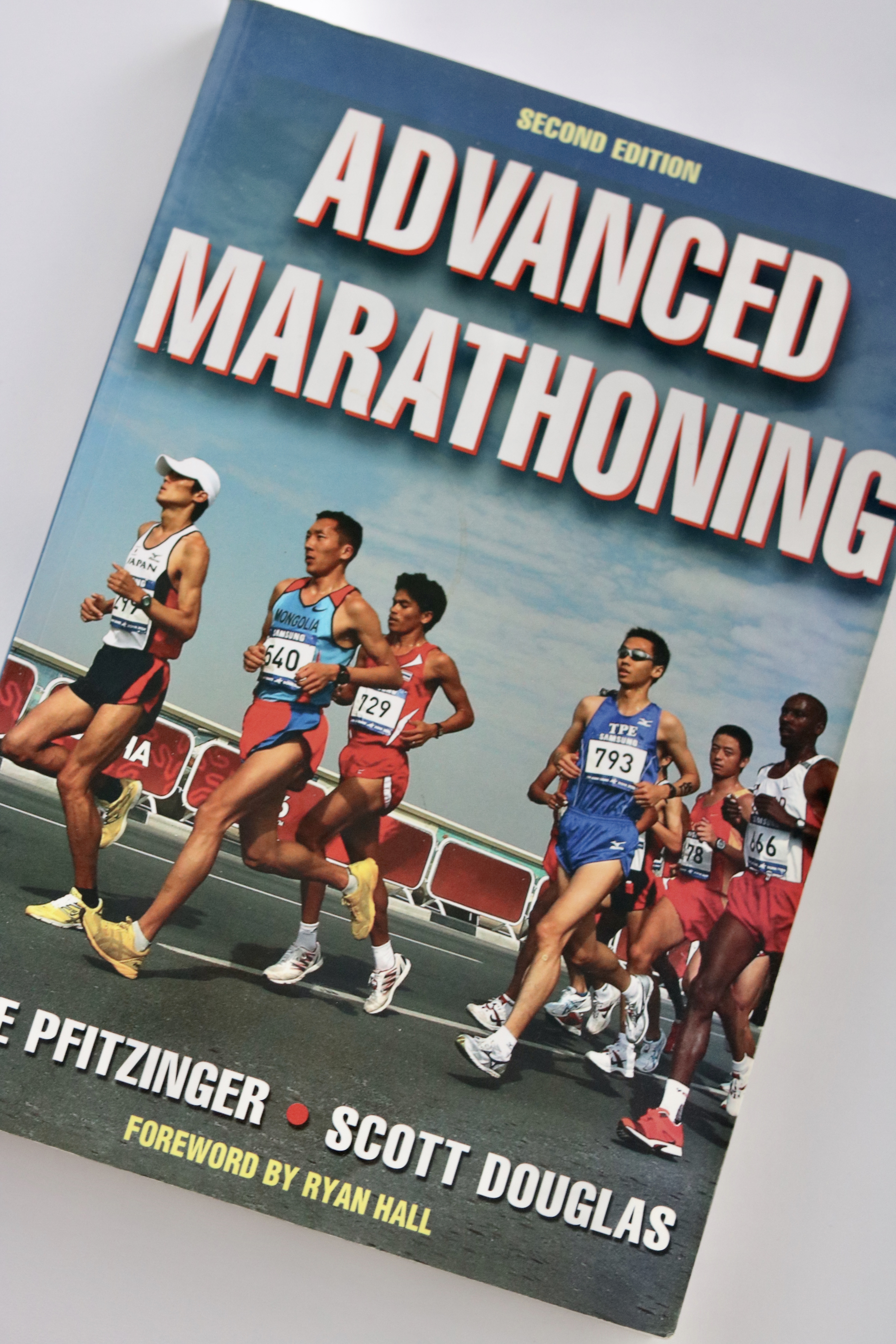
Advanced Marathoning was written by Pete Pfitzinger and Scott Douglas. Pete ran in two summer Olympics, and won the 1984 U.S. marathon team trials (beating Alberto Salazer). He later became an exercise physiologist so the guy knows his stuff. Scott Douglas is contributing editor for Runner’s World and a co-author for many running books, including Meb for Mortals (which is another great running book).
Advanced Marathoning has 18- and 12-week plans with different weekly distances, depending on your level. They recommend using the 18 week plan unless time truly doesn’t allow for it.
The lowest weekly distance plan goes up to 55 miles per week. The other plans are 55 to 70 miles per week, 70 to 85, and 85+ miles. I used the lowest mileage plan to train for the 2018 Boston Marathon, and it was still more more advanced than other training plans I had used previously. (For reference, the next year when training for the 2019 Boston Marathon with a running coach, I ran 50-70 miles a week.)
Here’s a sample of what the beginner-advanced marathon plan looks like, along with notes I made throughout training.
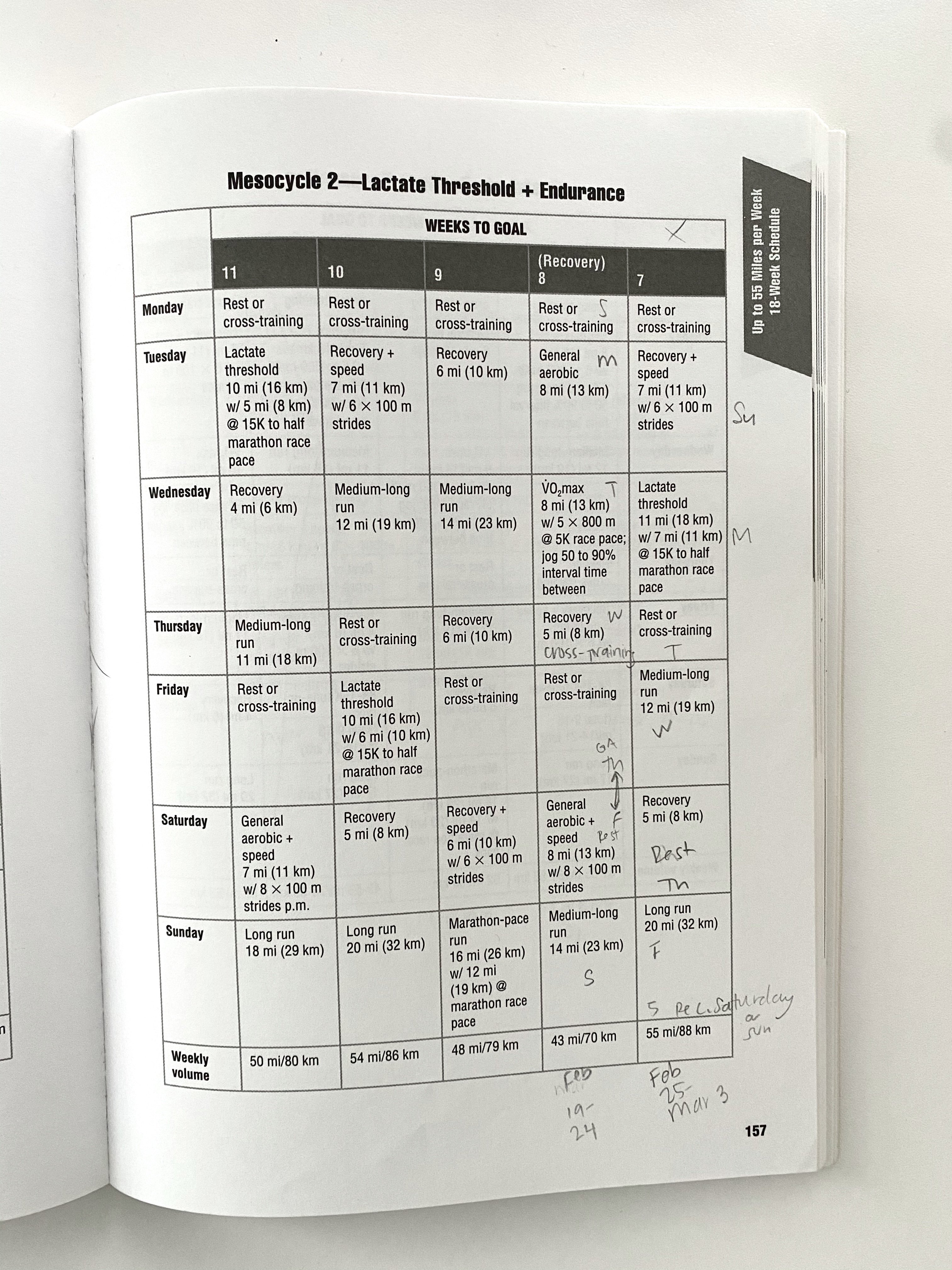 (I got permission from Scott Douglas to publish this page of the plan from the book.)
(I got permission from Scott Douglas to publish this page of the plan from the book.)
Here are the main things to note about the advanced marathon training plans in this book compared to other plans I’ve used.
The plans in this book use periodization and are broken in five mesocycles. Each mesocycle develops a different system to get you to race day well trained. And the final mesocycle helps you recover and return to running after race day. I especially love the last mesocycle since post-race day recovery and running is something nearly ALL race plans neglect to address.
I like that there is variety in the plan throughout the 12-18 weeks as well as variety throughout each week. You can see from that page that there are lots of interval workouts and cross training days. And I love the easy runs that are included. The variation helps prevent burnout.
When using the plan from Advanced Marathoning, I hit 55 miles and before that, I’m almost positive I’d never run more than 45 miles in one week. So, it definitely pushed my weekly milage compared to others . While the extra miles took extra time, I really enjoyed it. I especially loved the midweek long runs and the tempo runs. (But I always love runs with pace changes!) It’s worth noting that if you’re ramping up your milage, you may wanna read this post on preventing blisters ;).
Sometimes I questioned if it was too advanced for me, but I also think if a training plan feels easy, it’s not the right plan. You shouldn’t be running at a comfortable pace or distance all the time. Learning to deal with discomfort is part of improving. (Remember that discomfort is different from pain!). If you’re a novice or beginner, I’d probably stick to a different plan. This plan is not geared toward first time marathon runners, but you can find a beginner’s marathon training plan out there online!
This plan bumped up the long run distance pretty quickly compared to other plans I’ve used. But, there are also “down weeks” with reduced intensity and volume every few weeks to help balance that out. My body definitely craved the down week and easy runs. (And I think my brain craves it just as much.) The easy run and cross training days are an important part of training and conditioning. And rest days are equally important.
I reviewed my training log when I was using this plan and there was a note in there that I thought was telling: “My running feels the best it’s felt in a LONG TIME. I feel tired but strong.” And nearly all of my long runs had positive notes, e.g. felt great, could have gone further, pace felt easy, etc. My body definitely responded well to the variety of training.
One of my good running friends told me once, “It’s funny – the more you run, the better you get at running.” Definitely the truth.
Even if you don’t use the plans in the book, it’s worth buying since there is so much good information about how to run a successful marathon. There are sections on fueling, hydration, recovery, tapering, race day strategy and more. I read the entire thing in about a week and still regularly flip through it when I’m training for ANY race. It has helped motivate me when I’m dreading a run or feeling nervous about training. You can buy it on Amazon. (If you’re training for shorter distances – 5K to half marathons – buy Faster Road Racing.)
Before I used a plan from that book, I used Strava Premium training plans for years. Strava has plans for multiple distances, including 5K, 10K, half marathon and the full marathon. While I really like the Strava half marathon plan and I set a PR in my half following it, I burned out on those plans. That’s part of what led me to buy that book.
The general structure of the Strava training plans is pretty much the same, no matter the distance and I was craving variety. If you’ve never used them, you’ll likely enjoy for a while! Just perhaps don’t use it for dozens of races like I did.
Strava plans only go up to 12 weeks which may not be enough for some runners. I will say, I love how Strava tracks my personal data for me, and a book does require me to collect data manually.
Cost: $5 a month (with an annual plan) or $7.99 for a monthly plan to access the premium features, including training plans.
Before Strava, I used all sorts of random plans as a starting point and then tweaked them. I often ripped a plan out of Runner’s World Magazine or got one from Hal Higdon website and tweaked them. For my first marathon, one of my training buddies wrote my plan. In the years that followed when I ran a LOT of half marathons, I wrote most of my own training plans, and depending on your marathon goals, this may be good option for you.
Cost: This is obviously the most affordable! At most, you’ll have to pay for a Runner’s World Magazine subscription or borrow one from a friend.
Note: If you want to be self-trained, but have a little extra guidance without the cost of a coach, I provide support to members of my running course with their training plans, whichever ones they choose to use.
In 2019, I hired a coach (Enoch Nadler, an elite runner) to train me for the 2019 Boston Marathon. With his help, I set a new PR in the half marathon and a 10 minute PR at the 2019 Boston Marathon. Sites like RunnersWorld.com or Hal Higdon also offer online coaching services, some free and some paid.
The major benefit of a running coach is the personalized attention, both to training, your lifestyle and your recovery. The training schedule can be tailored about your work-life schedule. When I used the Advanced Marathon training plan, you’ll notice that I made tweaks throughout. I consulted a few running friends but sometimes I was just guessing. With a coach, the guess work is taken away. I shared in this post when and why you might consider hiring a running coach.
Cost: Varies, anywhere from $50 – $200+ a month.
I’d always choose a running coach if I had the option, but I do think this book is a great option!
When you’re choosing marathon training programs, make sure to take into consideration the factors of your lifestyle. If you love strength training, find a plan that explains how to best incorporate that. (Even if you don’t love it, runners really benefit from strength training, even 2-3x a week of body weight exercises! It helps reduce the risk of injury as well.) Read about how to deal with plantar fasciitis here.
You’ll also want to consider what your race conditions will be like. Are you going to run a hilly route? If so, you’ll want to make sure some hill training is incorporated. Running a trail race? Hit some cross country trails to prepare.
You can also find training plans that are made for your goal marathon race pace.
It’s going to be different for each runner and each race, and that’s part of the fun! I really liked the training runs and speed work workouts that are included in this book.
(If you want more details on how to evaluate specific training plans, I have a lesson dedicated to that in my online running course.)
While I didn’t touch on running nutrition in this post, it’s SUPER important. In fact, other than running, your pre and post run fueling is one of the most important aspects in marathon training. Read more about my marathon training diet here!
What’s been your favorite training plan?
Shop my favorite marathon gear


Leave a Comment
9 responses to “Advanced Marathon Training Plan”
I think I might try that for my Boston training next year. I’m not an advanced marathoner by any means – ran my first this past Nov, and BQ’d, so I’m a pretty good runner in general. Figuring out those speed workouts might be too much for my brain though lol!
I’m using Pfitz’s 70 mile plan for the first time. It’s great! A lot of my training in the past has included more speedwork, but I think I often overwork myself doing all that stuff. I’m enjoying the more marathon-specific workouts like Lactate Threshold and Marathon Pace runs. I’ve definitely noticed my “easy” pace is getting faster the past few weeks.
You did a 20 miler this past weekend, right? Does the 55 mile plan have a “week 0” before the race, too? I’m starting 8 weeks to goal now… but I might have miscounted the weeks before Boston!
70 mile plan – that’s awesome! I’ve typically done more speedwork in previous plans too and I think that’s part of why I got burned out so often. The recovery runs + medium long runs are a nice change!
Doh, yes, mine has a week 0 and now I’m all messed up haha! I need to reconfigure my plan!!
Training for my first. I used Hal Higdons, and looked at the build up run schedule for a local running group that’s training for the race. I combined the two and then had a couple marathoners look over my plan (including the wonderful Afoodiestaysfit :)! Thanks, again! Here’s to not having any clue as to what the next three months will look like or feel like! 🙂 I feel like this is definitely the biggest challenge I’ve ever taken on!!
What about the other training aspects that I don’t see in the training plan? Strength & mobility?
They have chapters on that, if you’re asking about the book specifically! 🙂
Trying to decide if this plan is for me I clsoe to BQing with training on my own and already run 45 to 50 miles a week.
If you’re already doing 45-50 miles a week, I think one of the plans in that book would work well for you!
Awesome job on your achievement Teri. I always wanted to run Boston. My wife ran it in 2008 so at least I was able to go and see it in person. I’m glad the plan that you used assisted you as well. Wishing you continued success in 2023.